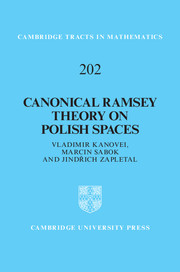Book contents
- Frontmatter
- Contents
- Preface
- 1 Introduction
- 2 Background facts
- 3 Analytic equivalence relations and models of set theory
- 4 Classes of equivalence relations
- 5 Games and the Silver property
- 6 The game ideals
- 7 Benchmark equivalence relations
- 8 Ramsey-type ideals
- 9 Product-type ideals
- 10 The countable support iteration ideals
- References
- Index
10 - The countable support iteration ideals
Published online by Cambridge University Press: 18 December 2013
- Frontmatter
- Contents
- Preface
- 1 Introduction
- 2 Background facts
- 3 Analytic equivalence relations and models of set theory
- 4 Classes of equivalence relations
- 5 Games and the Silver property
- 6 The game ideals
- 7 Benchmark equivalence relations
- 8 Ramsey-type ideals
- 9 Product-type ideals
- 10 The countable support iteration ideals
- References
- Index
Summary
The countable support iteration is a central operation on forcings since the pioneering work of Shelah (1998). It corresponds to a certain operation on σ-ideals, the transfinite Fubini power, as shown in Zapletal (2008, section 5.1). The natural question then arises whether this operation preserves natural canonization properties of the σ-ideals in question.
The question may be natural, but it also seems to be very hard, even for iterations of length two in the general case. We will prove a rather restrictive canonization result for iterations of a certain broad class of ideals, the best possible canonization result for the special case of iterations of Sacks forcing, and an anticanonization theorem for some other ideals. For a σ-ideal I on a Polish space X and a countable ordinal α ∈ ω1 write Iα for the transfinite Fubini power of I. This is a σ-ideal on Xα defined in the next section. There are certain obvious obstacles for canonization on Iα. For ordinal β ∈ α let idβ be the equivalence relation on Xβ connecting sequences x, y ∈ Xα if x ↾ β = y ↾ β. For an equivalence relation F on X, write idβ × F × ev for the equivalence relation connecting x, y ∈ Xα if x ↾ β = y ↾ β, and x(β) F y(β). It turns out that these are the only obstacles in a certain context.
- Type
- Chapter
- Information
- Canonical Ramsey Theory on Polish Spaces , pp. 244 - 263Publisher: Cambridge University PressPrint publication year: 2013



